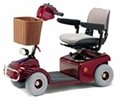Assistance for the Elderly to Live with Daughter?
by robin bennett
(carman, IL)
My parents are living independently but are struggling on a combined income of $1,070 per month. They own their home but the upkeep is too much for them.
They live in North Carolina and I live in Illinois. How do I move them here? We have plenty of space for them and they are ready, but what are the steps I begin to take?
REPLY from Caring-for-Aging-Parents.com:
The process of moving parents in with their adult children takes some time and planning.
The steps to this process are:
- Make sure your parents are ready and on-board with a move
Often the planning stages miss out the important fact of making sure your parents are ready for this move.
If you have done this and they are ready, make sure also that you both have the same timeline. I've met families that are ready to move their parents, who have agreed, but the parents assumed they meant in the future, not now.
- Meet with their medical professionals
Go with your elderly parents to meet all their medical professionals and get an update on their current medical care.
This should include their family doctor and pharmacist. Ensure you know how to transfer all their medical information and get their prescriptions filled right away at their new home.
It might also include their home care nurse, dietician or rehabilitation professionals (physiotherapist, speech language pathologist or occupational therapist). For a full review of the health care professionals your elderly parent might have involvement with, refer to Elderly Health Care.
Also think about who might accept them as a client in their new city.
- Pack up their old home
The next step would be to pack up their old home. Often, if elderly parents are needing to live with their adult children, they will not be able to undertake this large task on their own.
Decide with them beforehand how much space they will have and keep that in mind when packing.
Decide what you will do with all their "stuff" before you start. Will some of it go to relatives? Will some of the furniture come with them? Will some of it be donated to a charity?
Remember if your loved ones are suffering from elderly dementia, they may need some of the rooms in their new home set up like the home they have lived in for many years.
- Watch or ask them about their normal habits
Before they move, ask them about their regular schedule and a typical day or week. If they can't tell you this, spend some time with them and observe. This will make settling into a new home and city easier.
If your elderly parent would prefer a similar set-up to what they had (ie. in the bedroom) or have elderly dementia and will benefit from things looking the same, take pictures of their old home and furniture set up to refer to when you're moving into the new home.
- Start the move
It may be easier for your elderly parents to leave before the chaos of a move begins. Or they may need to be part of this process to "let go" and move forward.
Like any move, have all the household items that are going packed and ready to go so you have an idea of how large of a moving container or truck you will need.
Also, be sure all the household items that are not being moved are already gone.
Bring any necessary elderly safety equipment, such as elevated toilet seats or rollator walker with them.
- Move items into their new home
Think of their mobility when deciding where is the safest place for them to live. Planning so they can enter at a level entrance and live all on one floor is the best planning for the long term.
- Consider Elderly Safety Equipment
If they must go up stairs, consider if you need equipment to make this safe for them, such as handrails or a chair lift for stairs.
For information about other products for elderly safety, refer to Elderly Mobility Products, Elderly Bathroom Products or Equipment for Seniors.
- Let them settle in
Give your elderly parents time to settle into their new surroundings. Involve them in discussions about how they (and you) would like the household to run.
Consider things like where they will take their meals, who will do the cooking, if you would like to have all meals together as a family, how much alone time each family wants during the day, what they will do for elderly transportation, etc.
Elderly parents living with adult children can work out very well.
Taking the time to plan this move well, with open discussions along the way, will help tremendously. Great planning ahead!
Some other topics that might be of interest:
- Fall Prevention in the Elderly.
- Elderly Safety.
- Help for Elderly.
Thank you,
Tennille
Return to Caring for Aging Parents





